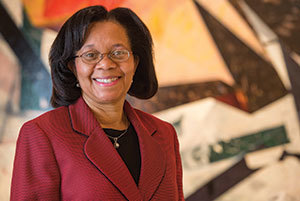 Pamela Nolan Young
Pamela Nolan Young
“While diversity and inclusion bring benefits to all colleges and universities, as a pre-eminent Catholic university, we are part of one of the most ethnically and culturally diverse organizations in the world, and we strive to reflect that diversity — and to make every individual who is part of the University community feel fully welcomed and included.“ President Rev. John I. Jenkins
Pamela Nolan Young, director for academic diversity and inclusion, joined the University in April 2016. It is a newly created role, the result of the work of the President’s Oversight Committee on Diversity and Inclusion and the emphasis President Rev. John I. Jenkins, C.S.C., has placed on diversity since the committee was formed in 2013.
Nolan Young is a self-described “military brat” born in Dothan, Alabama. She received her juris doctor degree from the Notre Dame Law School, and most recently worked as a private consultant on equity, diversity and inclusion issues for colleges, businesses and individuals. Previously she held positions in higher education, including director of institutional diversity and equity at Smith College and human resources director of North Shore Community College. Before the move to higher education, she held a variety of positions in Springfield, Massachusetts, where she was a practicing attorney, assistant district attorney and assistant city solicitor.
In the new position at Notre Dame, Nolan Young is responsible for coordinating the University’s academic diversity and inclusion efforts, and assisting with efforts led by vice presidents and associate provosts that focus on those issues. “I see my job in this way,” Nolan Young says. “My role is to work with all academic units so that they are places where our students, faculty and staff feel welcome and flourish.”
Her priorities in working with faculty are to engage in discussions around cultural competency and issues such as implicit bias that might affect hiring decisions. Nolan Young hopes to finalize a “best practices” document for recruiting in the spring. “I’m here to assist with recruitment and retention of underrepresented groups and women both among our faculty and our graduate student population,” she says. “During the fall I participated in the orientation programs for faculty and graduate students, co-facilitated workshops at the Kaneb Center for Teaching and Learning on cultural competency, micro-aggressions and race, class and gender. I also provided information on inclusive hiring practices to search committees. These activities will over time assist us in our larger goal.”
Additionally, Nolan Young has created other learning opportunities, such as a recent conference, “Are You All INclusive?” which was co-sponsored by the Office of the Provost, Notre Dame Research and Foundation Relations. The conference addressed diversity and inclusion from the perspective of incorporating those elements into grant proposals. The event drew more than 65 participants.
“Whether a grant proposal is in the social sciences, STEM or humanities, federal agencies and private foundations almost always have a requirement that the grant seeker address diversity in some way,” she notes. “The conference provided attendees with the knowledge and tools needed to draft stronger grant proposals.”
One point she makes is that the benefits of diversity and inclusion are not limited to people of color or other underrepresented groups. “Much data and research exist to indicate that diverse and inclusive classrooms, offices, faculty and co-workers lead to better results,” she said.
Nolan Young co-hosts a diversity and inclusion practitioners group, with both faculty and staff representation. “The group is comprised of individuals whose work research or personal interest align with social justice issues,” she said. “We meet monthly to share information and discuss issues on campus.” Ultimately, the goal is inclusive excellence, she adds. Here at Notre Dame, a faith-based institution, the question, she says, “are we attracting and retaining students and faculty who will respect the faith tradition, and reflect the ethnic and cultural diversity we seek.”